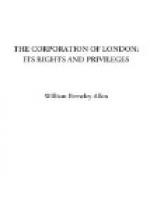The tyrannical and oppressive treatment of the citizens of London by Charles I. is too well known to need more than a passing allusion. Not only did he imprison the aldermen for refusing to act dishonourably towards their fellow-citizens; not only did he make illegal demands and impose arbitrary fines, but he even deprived them of the right of petition and remonstrance. Such despotic conduct could not do otherwise than alienate the affection of those who had previously displayed many proofs of their loyalty to the Crown and attachment to the royal person. The City consequently made common cause with the Parliament, freely expending both blood and treasure in defence of the national freedom. Who has mot read with kindling cheeks how the bold ’prentices, armed only with spears, withstood a furious charge of the fiery Rupert at the head of his gallant cavaliers? But though prepared to resist the abuse of the royal prerogative, the citizens were not disposed to transfer their allegiance to a usurper, who, in the name of liberty, trampled liberty under foot. Accordingly we find them consistently opposed to the military absolutism of Cromwell, and among the first to co-operate with Monk in effecting the restoration to the throne of the royal line of Stuart.
The Stuarts, however, like the Bourbons, were incapable of benefiting by the lessons of adversity. It was not long before “the merry monarch” was involved in most unmirthful disputes with the citizens, whom he endeavoured to deprive of their ancient right to elect their own sheriffs. For the moment he partially succeeded, and, encouraged by this success, formed the design of seizing the charters of every corporate borough in the kingdom. The chief difficulty rested with London: if that could be overcome, the smaller cities would fall an easy prey. The law officers of the Crown were accordingly instructed to make out a case to sanction the forfeiture of the city charters. A double pretext was soon invented. It was stated that nine years before, the Common Council had levied a new scale of tolls on the public markets rebuilt after the great fire, and at a more recent period had printed a libellous petition impugning the king’s justice. On these slender pleas a writ of quo warranto was taken out against the City, and the judges, under the undoubted influence of the Court, pronounced sentence of forfeiture, although a charter of the 7th Richard II. expressly provides against any forfeiture of the City’s liberties notwithstanding any abuse of them whatsoever. This exhibition of violence so terrified the other corporations of the kingdom, that most of them at once tendered the surrender of their franchises, with the ignominious hope of obtaining better terms for themselves. James II. walked in the steps of his brother, and showed even greater determination to destroy the liberties of the nation. The disaffection of his subjects and the landing of the Prince of Orange




